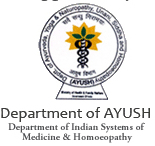Organization:Ministry of AYUSH
 |
The Ministry of Ayurveda, Yoga and Naturopathy, Unani, Siddha and Homoeopathy, abbreviated as AYUSH, is a governmental body in India purposed with developing, education and research in ayurveda (Indian traditional medicine), yoga, naturopathy, unani, siddha, homoeopathy, Sowa Rigpa (Traditional Tibetan medicine) and other Indigenous medicine systems.
It was created in March 1995 as the Department of Indian Systems of Medicine and Homoeopathy (ISM&H). It is operated under the Ministry of Health and Family Welfare.
AYUSH received its current name in March 2003. The Ministry of AYUSH was formed with effect from 9 November 2014 by elevation of the Department of AYUSH.[1]
Bodies under AYUSH
Research councils:[2]
- Central Council for Research in Ayurvedic Science(CCRAS)
- Central Council for Research in Siddha Medicine (CCRS)
- Central Council for Research in Unani Medicine (CCRUM)
- Central Council for Research in Homeopathy Medicine (CCRH)
- Central Council for Research in Yoga and Naturopathy Medicine (CCRYN)
- Pharmacopoeial Laboratory for Indian Medicine (PLIM)
- Homoeopathic Pharmacopoeia Laboratory (HPL)
National Institutes:[3]
- Dr. Sarvepalli Radhakrishnan Rajasthan Ayurved University, Jodphur
- National Institute of Ayurveda, Jaipur (NIA)
- National Institute of Siddha, Chennai (NIS)
- National Institute of Homoeopathy, Kolkata (NIH)
- National Institute of Naturopathy, Pune (NIN)
- National Institute of Unani Medicine, Banglore (NIUM)
- Institute of Post Graduate Teaching and Research in Ayurveda Medicine, Jamnagar, Gujarat (IPGTR)
- Rashtriya Ayurveda Vidyapeeth(National Ayurveda University), New Delhi (RAV)
- Morarji Desai National Institute of Yoga Science, New Delhi (MDNIY)
- North Eastern Institute of Ayurveda and Homeopathy (NEIAH)
- All India Institute of Ayurveda, Delhi
Professional councils:
- Central Council of Homoeopathy Medicine (CCH)
- Central Council of Indian Medicine (CCIM)
- Central Council of Sowarigpa (Tibetan) Medicine (CCTM)
- Central Council of Naturopathy Medicine (CCNM)
- Indian Pharmacopoeia Commission
Collaborations
- Traditional Knowledge Digital Library (TKDL): A collaboration with the Council for Scientific and Industrial Research (CSIR), set up in 2001, to prevent grant of "bed" patents on traditional knowledge and biopiracy. The digital library is being developed on codified traditional knowledge on Indian systems of medicines such as Ayurveda, Unani, Siddha and Yoga. Nearly 805,000 Ayurvedic formulations, 98,700 Unani formulations, and 9,970 Sidha formulations have been transcribed in patent application format in five languages: English, French, German, Spanish and Japanese.[4]
Criticism
There is a strong consensus among the scientific community that homeopathy, naturopathy, and similar modalities, are nothing more than placebo.[5][6][7][8]
References
- ↑ "Archived copy". Archived from the original on 22 August 2013. https://archive.is/20130822171213/http://indianmedicine.nic.in/index.asp?lang=1. Retrieved 2013-08-22.
- ↑ "Research councils". AYUSH website. http://indianmedicine.nic.in/index2.asp?slid=52&sublinkid=37&lang=1.
- ↑ "National Institutes". AYUSH website. Archived from the original on 25 November 2013. https://web.archive.org/web/20131125114305/http://indianmedicine.nic.in/index2.asp?slid=50&sublinkid=33&lang=1.
- ↑ "Know Instances of Patenting on the UES of Medicinal Plants in India". PIB, Ministry of Environment and Forests, Government of India. May 6, 2010. http://pib.nic.in/release/release.asp?relid=61511. Retrieved 21 May 2010.
- ↑ Krishnan, Vidya. "AYUSH Ministry rails against global study on homeopathy" (in en). The Hindu. http://www.thehindu.com/sci-tech/health/policy-and-issues/ayush-ministry-rails-against-global-study-on-homeopathy/article8561466.ece.
- ↑ "India's govt not only believes in homeopathy, it spends money on it". http://www.dailyo.in/variety/ayush-homeopathy-snake-charmers-placebo/story/1/15802.html.
- ↑ Mukunth, Vasudevan. "After BGR-34, Ministry of AYUSH Pushes #Homeopathy4Diabetes" (in en-GB). https://thewire.in/101684/ayush-homeopathy-diabetes-advertising/.
- ↑ "Bridge course for AYUSH – the seed of destruction" (in en). http://www.thehansindia.com/posts/index/National/2018-01-08/Bridge-course-for-AYUSH--the-seed-of-destruction/350752/amp.
External links
